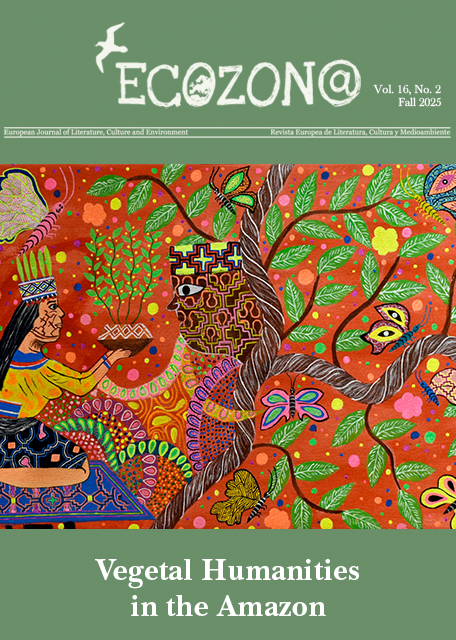Hungry Unlike the Wolf: Ecology, Posthumanism, Narratology in Fred Vargas’s Seeking Whom He May Devour
DOI:
https://doi.org/10.37536/ECOZONA.2012.3.2.478Schlagworte:
Posthumanism, inhumanism, animals, crime fiction, narrative, posthumanismo, inhumanismo, animales, novela policíaca, narrativaAbstract
This paper examines posthumanism as a philosophical position equipped to inform ecocriticism and the potential of popular fiction to articulate ecological complexity. Posthumanism will be reappraised as a dialectical model that decentres the human in relation to ‘evolutionary, ecological, or technological coordinates’ (Wolfe 2010: xvi) while nevertheless retaining a sense of the integrity of, and boundaries between, human and nonhuman species or phenomena. It will be argued that a novelistic emphasis on human being, agency, and action, coupled with devices of genre, plot, and narrative – are consistent with the process of human self-examination engendered by posthumanism.
The essay will, thereafter, illustrate and examine this approach through the French crime writer Fred Vargas’s1999 novel Seeking Whom He May Devour. Identifying two human protagonists – the Canadian conservationist Johnstone and his girlfriend Camille – an initial decentring of the human subject will be examined in relation to two equivalent, nonhuman protagonists, the French Alps and the wolf. Utilising newspaper interviews that highlight Vargas’s own posthumanist perspective (grounded in her profession as an archaeologist), I will examine a) how the novel explores appropriate relationships between human and nonhuman animals; b) how Vargas utilises both the generic features of the crime novel – e.g. the resolution of a ‘crime’ – and the subtle narrative manipulations of character focalisation to construct (via the preferred ‘point of view’ offered by Camille) a posthumanist position on human/animal relations which Vargas explicitly opposes to the inhumanism represented by Johnstone.
Resumen
Este artículo examina el posthumanismo como una posición filosófica dotada para contribuir con la ecocrítica y el potencial de la ficción popular para articular la complejidad ecológica. El posthumanismo será revaluado como un modelo dialéctico que descentra al ser humano en relación con “las coordinadas evolutivas, ecológicas o tecnológicas” (Wolfe, Posthumanism xvi), mientras que aún así retiene un sentido de la integridad de, y de las fronteras entre, las especies o fenómenos humanos y no-humanos. Se argumentará que un énfasis novelístico en el ser humano, la agencia y la acción, junto con los recursos del género, argumento y narración, son consistentes con el proceso del auto-examen engendrado por el posthumanismo.
Después, este ensayo ilustratá y examinará este enfoque a través de la novela Seeking Whom He May Devour (1999), del escritor francés de novela policíaca Fred Vargas. Identificando a los dos protagonistas humanos, el conservacionista canadiense Johnstone y su novia Camille, el de-centramiento inicial del sujeto humano será examinado en relación a los dos protagonistas no-humanos equivalentes: los Alpes franceses y el lobo. Usando entrevistas en periódicos que destacan las perspectiva posthumanista de Vargas (basada en su profesión como arqueólogo), examinaré: a) cómo la novela explora las relaciones apropiadas entre animales humanos y no-humanos; b) cómo Vargas utiliza tanto las características genéricas de la novela policíaca (e.g. la resolución de un crimen) y las sutiles manipulaciones narrativas en la focalización de los personajes para construir (a través del favorecido “punto de vista” que ofrece Camille) una posición posthumanista en las relaciones humanas/animales que Vargas explícitamente opone al inhumanismo que Johnstone representa.
Downloads
Downloads
Zusätzliche Dateien
Veröffentlicht
Ausgabe
Rubrik
Lizenz
Authors who publish with this journal agree to the following terms:
a) Authors retain copyright and grant the journal right of first publication with the work simultaneously licensed under a Creative Commons Attribution License that allows others to share the work with an acknowledgement of the work's authorship and initial publication in this journal (CC BY-NC for articles and CC BY-NC-ND for creative work, unless author requests otherwise.
b) Authors are able to enter into separate, additional contractual arrangements for the non-exclusive distribution of the journal's published version of the work (e.g., post it to an institutional repository or publish it in a book), with an acknowledgement of its initial publication in this journal.
c) Authors are permitted and encouraged to post their work online (e.g., in institutional repositories or on their website) prior to and during the submission process, as it can lead to productive exchanges, as well as earlier and greater citation of published work (See The Effect of Open Access).










